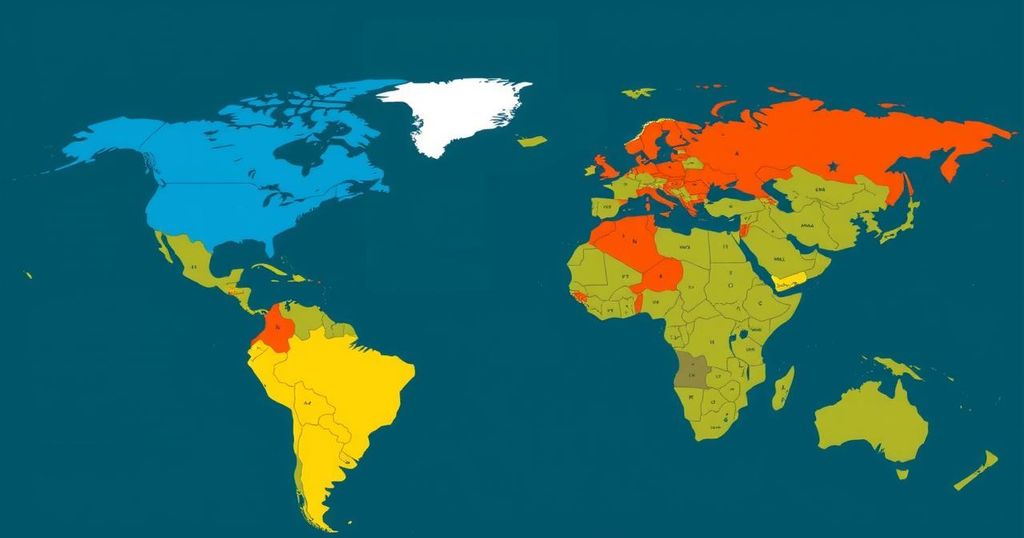Climate change
AFP, AFRICA, AFRICAN GROUP OF NEGOTIATORS, ALI MOHAMED, ASIA, AZERBAIJAN, BAKU, BRITAIN, CASPIAN SEA, CLIMATE CHANGE, CLIMATE JUSTICE, EA, EAMON RYAN, ENERGY, EU, EUROPEAN UNION, JAPAN, KENYA, NORTH AMERICA, PARIS AGREEMENT, RYAN, SANCTIONS, SAUDI ARABIA, UNITED STATES
Fatima Khan
0 Comments
EU Increases Aid Offer to Developing Nations Amid Climate Negotiations
The European Union has raised its climate funding offer to developing nations to $300 billion annually, seeking to revive stalled negotiations at COP29. This increase follows an earlier rejected offer of $250 billion. The discussions are characterized by disagreements over financing levels and commitments to reduce fossil fuel reliance. Activists and negotiators emphasize the urgency of meaningful commitments from wealthy nations amid growing climate challenges.
The European Union has increased its financial offer to assist developing countries adversely affected by climate change to $300 billion annually, aiming to rejuvenate deteriorating negotiations at the ongoing UN climate conference, COP29, in Baku. This follows a previous offer of $250 billion, which was dismissed by developing nations as insufficient in light of the escalating climate crisis. As these discussions progressed overnight, negotiators sought common ground on various aspects of the climate agreement, with additional financial contributions from wealthy nations essential to secure a viable deal.
However, the EU’s proposal is intertwined with prerequisites, including a continuous global assessment aimed at reducing fossil fuel reliance. This proposition has faced resistance, notably from Saudi Arabia, which desires leniency on fossil fuel transition commitments established at COP28.
Irish Climate Minister Eamon Ryan expressed cautious optimism for achieving a consensus, emphasizing the urgency of demonstrating tangible action against climate challenges. Concurrently, Ali Mohamed, chair of the African Group of Negotiators, indicated a willingness for constructive dialogue but warned that stagnation could jeopardize the COP’s outcomes. Furthermore, a coalition of over 300 activist organizations condemned developed countries for allegedly shirking their financing responsibilities. They critiqued their inconsistency in upholding a rules-based international system regarding climate finance obligations.
While the draft framework includes a broader target of $1.3 trillion per year to address climate impact, most relief is anticipated to derive from private sector financing. Developing nations advocate for at least $500 billion due to concerns surrounding inflation and the adequacy of previous pledges, positioning the current negotiations as pivotal for the future of global climate efforts.
The article details the ongoing UN climate talks, COP29, in Baku, where developed countries are negotiating financial support for those nations most affected by climate change. It highlights the tension surrounding funding levels and commitments from wealthy nations to support developing countries’ climate resilience efforts. At the heart of the discussions is the recognition that climate change exacerbates existing inequalities, necessitating urgent financial redistributions. The concerns expressed by negotiators and activist groups underscore the critical need for developed countries to honor previous commitments and provide meaningful financial support.
In conclusion, the EU’s proposal to increase climate financing to $300 billion annually reflects the urgent need for a sustainable agreement to aid developing nations facing the brunt of climate change. However, this situation underscores deep-seated tensions regarding financial obligations and fossil fuel commitments among nations. The outcome of these negotiations will likely have profound implications for international climate policy and cooperation going forward.
Original Source: www.rfi.fr




Post Comment